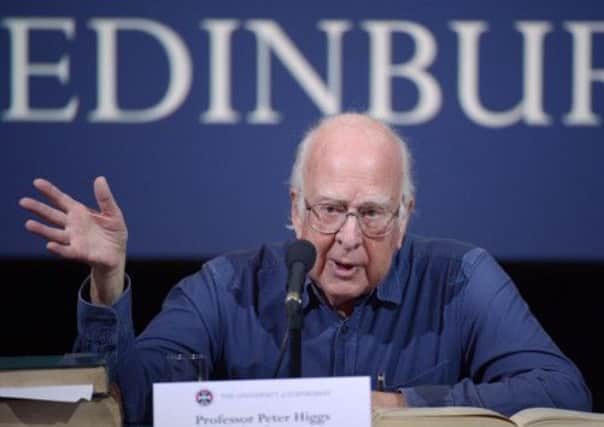Ex-neighbour told Peter Higgs of Nobel Prize win


The 84-year-old emeritus professor at Edinburgh University was on his way home after a leisurely two-course lunch in Leith on Tuesday when he learned he had scooped science’s most prestigious award, which he shares with Belgian physicist Francois Englert.
Prof Higgs, who does not own a mobile phone, told a press conference at the university yesterday that was he walking along the street near his home in Edinburgh when his former neighbour jumped out of her car to congratulate him on the news.
Advertisement
Hide AdAdvertisement
Hide AdHe said: “A lady in her 60s or 70s got out [of her car] and introduced herself as a former neighbour, a widow of a judge who died recently, and congratulated me on the news and I said, ‘What news?’. And so she told me that her daughter had phoned from London to alert her to the fact that I had got this prize.”
He said he had been on his way home from lunch at a place chosen for its “remarkable range of good beers”. Untouched by the media frenzy going on around the world, he had enjoyed “a bowl of soup and a main course that involved sea trout”.
“I heard more about it obviously when I got home and started reading the messages,” he said.
“I had originally planned to be rather further away, in the west Highlands, but that plan didn’t come to anything. I simply got out of the way for a short period.”
Prof Higgs received the award in recognition of his work in the 1960s on the theory of the Higgs boson particle, to which he gave his name. Discovering the particle had become one of the most sought-after goals in science. The team of scientists behind the
$10 billion Large Hadron Collider at the Cern nuclear research facility, in Geneva, Switzerland, made proving its existence a key priority.
Half a century later, the existence of the so-called “God particle”, which gives matter its mass, was proved beyond any doubt at Cern last year.
He and Prof Alan Warner, his close friend and colleague, had flown home to Scotland from Geneva the next day, and Prof Higgs had turned down a glass of prosecco to opt instead for a more modest bottle of London Pride ale.
Advertisement
Hide AdAdvertisement
Hide AdAs a result, he was presented with a bottle of the same beer at yesterday’s packed press conference, which he held aloft as he explained its significance.
Speaking about the Nobel Prize at the University of Edinburgh, he said: “I’m obviously delighted. But rather relieved in a sense that it’s all over, because it has been a long time in coming.”
He discovered from a friend that he had previously been nominated for the prize in 1980, but the Royal Swedish Academy of Science rules state that theories must be confirmed by experiment. “It seemed to me for many years that the experimental verification might not come in my lifetime,” he said.
So will he be pushing the boat out now that he has won the prize?
“I shall be celebrating with my family and the help of a bottle or two of champagne this evening,” he said.
Prof Higgs joins Marie Curie, Sir Alexander Fleming and
Albert Einstein in the ranks of Nobel winners. But the shy physicist says his new celebrity status means he is looking forward to the future “with some foreboding” after experiencing the frenzy of attention surrounding the experiments.
He said: “I realise I’ll have difficulty over the next few months having my life to myself.”
Prof Higgs also stressed the involvement of other theorists along with scientists at Cern who have not been as publicly credited as he said he has.
Advertisement
Hide AdAdvertisement
Hide AdHe said: “I should remind you that although only two of us have shared this prize, Francois Englert of Brussels and myself, that the work in 1964 involved three groups of people, (including) two in Brussels.
“Unfortunately Robert Brout died a few years ago so is no longer able to be awarded the prize, but he would certainly have been one of the winners if he had still been alive.
“But there were three others who also contributed and it is already difficult to allocate the credit amongst the theorists. Although a lot of people seem to think I did all this single-handed, it was actually part of a theoretical programme which had been started in 1960.”
He does not yet know what he will do with the £776,000 prize, but the university has already begun fundraising for a new home for the recently established Higgs Centre for Theoretical Physics, which will build on his legacy.
The plan behind the centre, which will receive funding from the Scottish Government as well as private individuals, is to create a hub where global scientists and industry experts can collaborate and new generations of physicists can be nurtured.
The Swedish prize was established by businessman Alfred Nobel and was first awarded in 1901 to honour achievements in science, literature and peace.
The Higgs-Englert award recognises the “theoretical discovery of a mechanism that contributes to our understanding of the origin of mass of subatomic particles”.